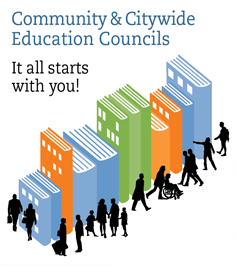How Does The Selection Process Work
What does a CEC member do?
CEC members have the following duties and responsibilities:
- Promote the achievement of education standards and objectives relating to the instruction of students
- Participate in training and continuing education programs
- Approve zoning lines as submitted by the superintendent
- Prepare and publish a school district report card which includes measures of the academic and fiscal performance of the school district
- Review the district’s educational programs and assess their effect on student achievement
- Hold meetings at least every month with the superintendent and public at-large to discuss the current state of the schools in the district
- Liaison with and provide assistance to School Leadership Teams (SLTs)
- Complete an Annual Financial Disclosure form
- Consult on the selection of a community superintendent
- Advise the chancellor and the city board of district concerns
- Submit an annual evalution of the superintendent to the chancellor
- Hold a joing public hearing with the chancellor, deputy chancellor, or the chancellor’s designee as required by law
What does a Citywide Council member do?
Citywide Council members have the following duties and responsibilities:
- Advise and comment on educational or instructional policies involving the student communities represented by the CouncilFor CCHS – students in high school
- For CCELL – students in bilingual or English as a second language programs
- For CCSE –students with disabilities
- For the D75 Council – students enrolled in District 75 schools
- Issue an annual report on the effectiveness of the city district in providing services to the student community represented by the Council
- Hold at least one meeting per month open to the public during which the public may discuss issues facing the student community represented by the Council.
What kind of time commitment would I be making as a Council member?
- Councils are expected to attend monthly meetings with the superintendent and the public. In addition, members are strongly encouraged to participate in school visits and public forums where they can become better informed about issues facing students in the New York City public schools.
Is there a penalty for missing Council meetings?
- Yes. Council members who have more than three unexcused absences officially vacate their seat.
Do Council members get paid?
- No, Council members volunteer their services. However, certain expenses may be reimbursed.
When does the term for new Council members begin?
- The new term for Council members will officially begin on July 1, 2013.
How long are Council members expected to serve?
- The term for Council members is two years.
Will Council members be trained for their role?
- Yes, Council members are required to participate in training within the first three months of their term. Trainings are designed to inform members about their powers, functions and duties, as well as the powers of other governing authorities responsible for public education. Additionally, the training sessions serve to acquaint Council members with the structure of the Department of Education and how to access information and resources. Council members are also mandated to participate in continuing education programs that keep them up-to-date on issues affecting public school governance. These trainings and continuing education programs will be administered by the Division of Family and Community Engagement (FACE).



